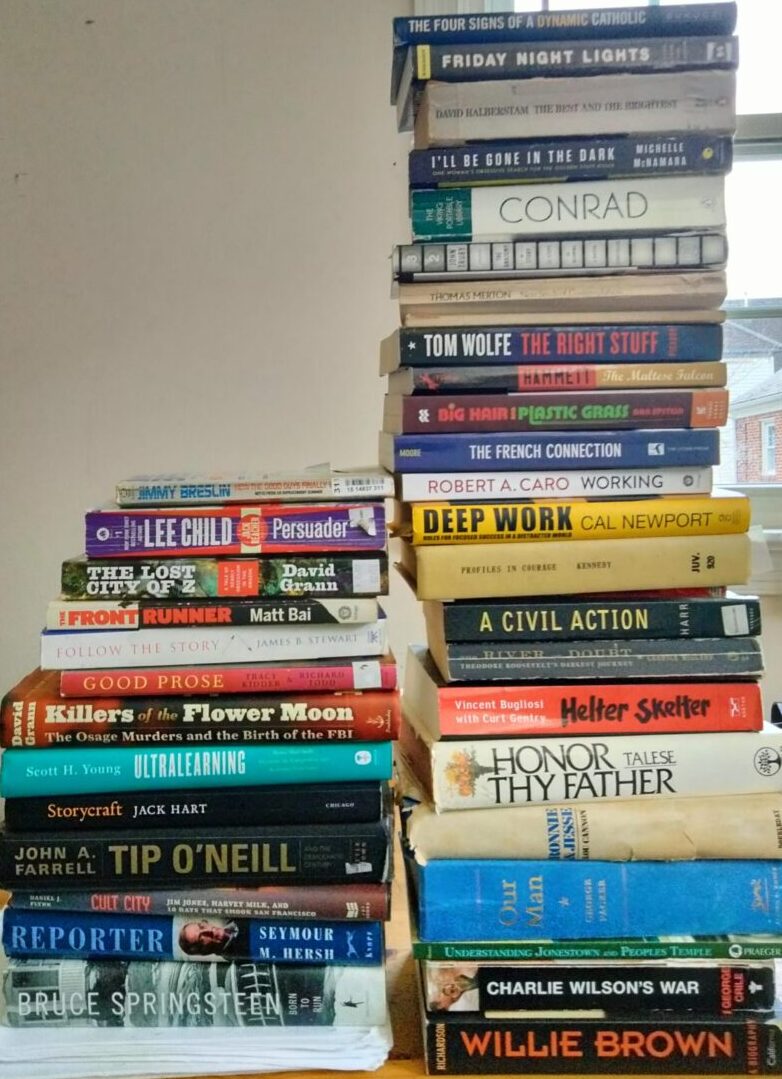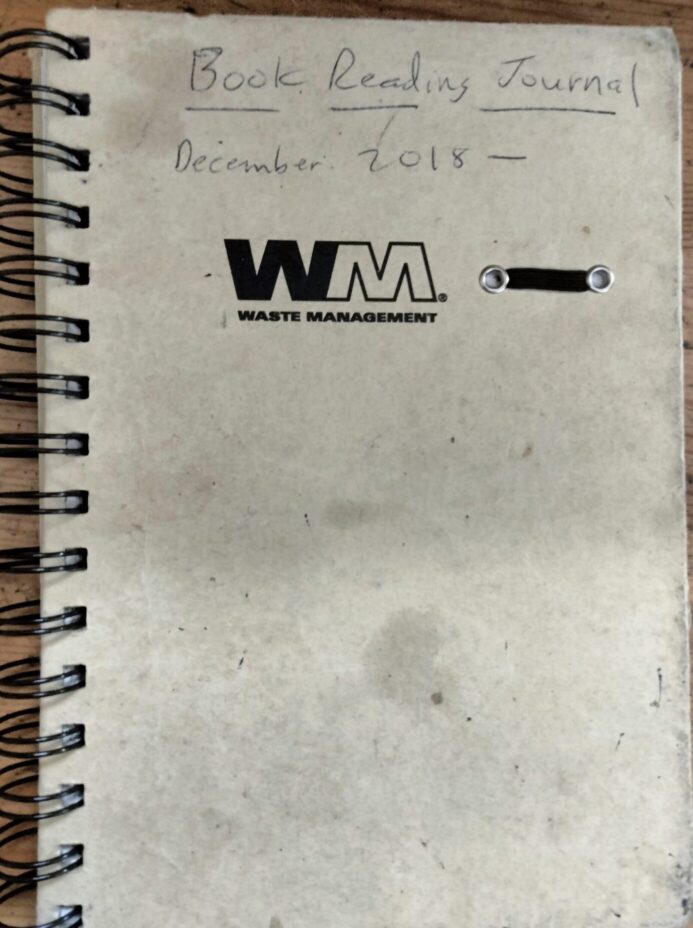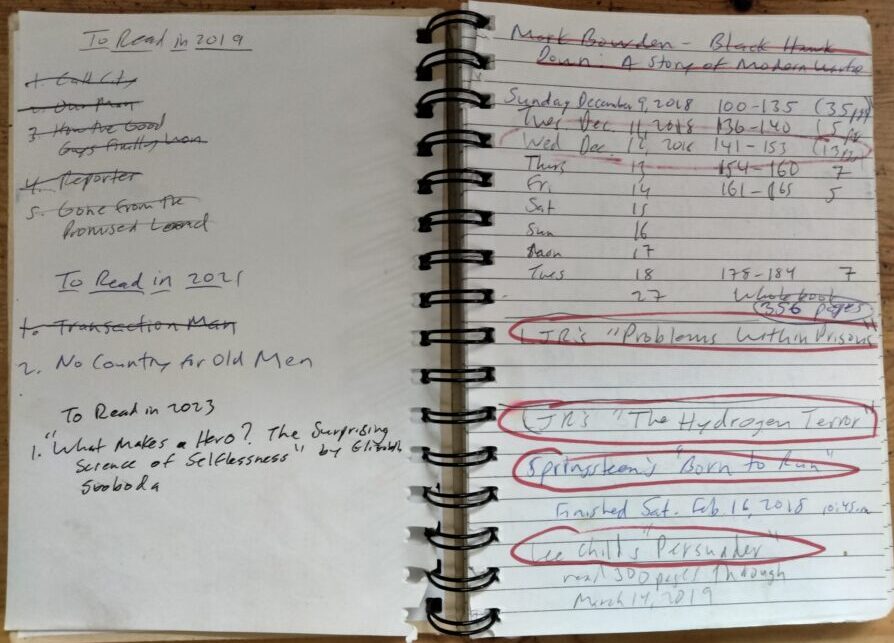How a Lowly Notepad Can Help You Read Twice as Many Books

(On the left are the books I read in 2019, the first year I used the notebook as a tracker; on the right are the books I read the following year).
The other day, a friend complained he should have finished a book earlier than he did. He liked the book and admired the author, but he was annoyed by the book’s length and presumably the slow rate at which he read. Readers make similar complaints frequently.
I, too, have been irked by my inability to finish reading a book sooner—If I don’t finish it now, when will I ever?! So I would be remiss if I failed to mention my secret weapon to reading more books and more books quickly: a spiral-bound notepad.
The notepad’s origins were, uh, pedestrian.
In an alley behind my English basement apartment on Capitol Hill five years ago, I found it lying in or outside a blue or green plastic garbage can, next to another notebook or two, pens, folders, and reams of paper. As a believer in the adage “waste not, want not,” I picked up the discarded stationery and other items and took them home.
The medium-size notepad itself could not be confused with a moleskin- or leather-bound notebook, a piece of parchment about which certain readers are prone to wax rhapsodic. Its cover and back are made of cardboard and black plastic coils keep the 100 pages together. On the cover are the initials WM for Waste Management Inc., a public firm whose late founder, Wayne Huizenga, used to own the Miami Marlins and the NHL’s Florida Panthers. (I suspect the notebook, which was made by the Quebec-based company Spector & Co., was a giveaway item at an industry conference in D.C.).

Today, the notepad looks even more pedestrian. It has ink smudges and oil stains. If you had told me the notepad would be my ticket to reading twice or three times as many books as I had, I would have laughed.
Yet the trash has indeed become a treasure.
Since December 2018, the first month I put the notebook into use, I have filled more than sixty-three pages. On each line is the date and the number of pages I read that day. This is nothing fancy. For the other day, I scribbled “Mon. Jan 28” and the pages I read “383-91, 392-400, 401-432.”
I like the notepad because it’s simple and easy to use. Each line is a quarter inch wide and the black spirals are sturdy. I don’t worry the notepad will break apart or I will lose some pages. At five-and-a-half by eight inches, the notepad is the right size. I can put it on top of the book I am reading or in a desk drawer without fuss.
In 2019, the results of my new method were nothing special. I read fourteen books. That’s a decent clip for an ordinary American or even a full-time reporter. (Each year, nearly one-quarter of Americans read no books in full or in part).
I hit my stride in 2020. I read thirty-one books. This was the year of the pandemic, so with nearly all workers consigned to home, I had few options other than to read on weeknights and at lunch breaks. Whatever the cause, I read more than twice the books as I had the year before.
Indeed, I have not reached that total since, although I came close last year with twenty-seven books.

This is not meant as a boast. Many professional writers and editors read sixty- to one hundred books a year. My point is a humble tool can have outsize effects.
Everybody seems to agree that tracking your progress is the simplest, most effective strategy for achieving a good outcome; one writer even called the method “the miracle of self-monitoring.”
The question is why this should be so.
After reading the literature online, I conclude that a book reading journal or notepad can act as an individual box score for readers. It makes objective the subjective. As some writers note, no baseball or football player would take the field for a game if he or she didn’t know the score.
As a reader may perceive you are turning a lot of pages. Yet the notepad says otherwise. Sure, you read a book a month, but the book was only 500 pages. That means you read fewer than eighteen pages a day.
The notepad as box score
By acting as a kind of customized box score, the notepad can have another good effect. It prunes your time. You read more. You put away childish things like bingeing on Netflix or getting lost on social media. After all, you got a book to read, dammit!
To be sure, on many days I have read no more than five or six pages. Sometimes that’s unavoidable; you have other commitments besides cracking open a book. Yet I find the notepad helps keep me conscious of how little I read. It acts almost as a subtle reminder I need to return to hitting the books again.
Even keeping track of your daily page counts is no panacea.
It’s best to set a goal about the number of books or pages you would like to read each day.
Greater expectations
In years past, my goal was modest: to read two dozen books a year. I figured two books a month would help me not only in life but also develop a specialty in the book about Jonestown my friend Dan and I plan to write.
Yet this year I concluded my sights were set too low. If I read thirty-five pages a day every day, I could read three dozen books a year. That’s a respectable total.
Some writers lament the decline of a literary culture in the United States such as the one we had in the middle twentieth century. I think their complaint is a bit misplaced; books are a tool that can be used for good and for ill, as anyone who studied the California prisoner rights movement of the 1960s and early 1970s knows.
Yet I think for most people books are a frugal chariot that bears the human soul. I would add the device that can put readers on the chariot can be more frugal still.
-30-

As someone who has kept score with you at a baseball game, I appreciate the analogy.
A gem of a poem by Dickinson. Thank you.
Hey there! I’ve been reading your web site for a long time now and finally got the
courage to go ahead and give you a shout out from
Houston Tx! Just wanted to tell you keep up the great
job!